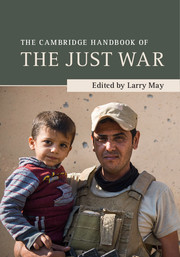Book contents
- The Cambridge Handbook of The Just War
- Cambridge Handbooks in Philosophy
- The Cambridge Handbook of The Just War
- Copyright page
- Contents
- Contributors
- Foreword
- Introduction
- Part I Historical Background
- Part II Initiating a Just War
- Part III Conducting a Just War
- Part IV Just War and International Legal Theory
- Afterword
- Bibliography
- Index
- References
Bibliography
Published online by Cambridge University Press: 01 February 2018
- The Cambridge Handbook of The Just War
- Cambridge Handbooks in Philosophy
- The Cambridge Handbook of The Just War
- Copyright page
- Contents
- Contributors
- Foreword
- Introduction
- Part I Historical Background
- Part II Initiating a Just War
- Part III Conducting a Just War
- Part IV Just War and International Legal Theory
- Afterword
- Bibliography
- Index
- References
- Type
- Chapter
- Information
- The Cambridge Handbook of the Just War , pp. 314 - 334Publisher: Cambridge University PressPrint publication year: 2018



